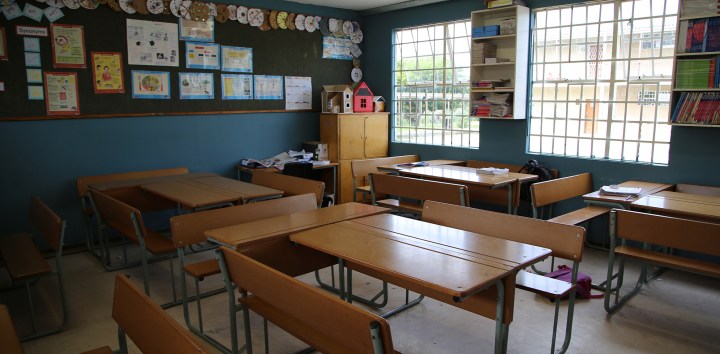DM168 Education
Our schools’ bullying scourge

The recent suicide of a schoolgirl in Limpopo has again highlighted the serious issue of learner-on-learner violence.
First published in the Daily Maverick 168 weekly newspaper.
A month before young Lufuno Mavhunga tragically took her own life after being publicly bullied and shamed, allegedly by another learner at her school, Mbilwi Secondary School in Limpopo, another young boy in the Western Cape attempted to take his own life for the same reason.
The grade five learner from a small farm school in Paarl, Joostenberg Primary, had downed six tablets, intending to take the entire container of painkillers, when he was discovered by a family member on Saturday 14 March.
He was given milk to neutralise the minor overdose, the distraught mother said, speaking to DM168 over the telephone.
The parents, who can’t be named to protect their children’s identity, said the day after his suicide attempt, the boy stole R300 from his mother’s room to give to the bully to leave him alone.
“Now that behaviour told me that there is grave trouble because the same child who was found drinking pills is now stealing money from home, something he has never done before,” she said.
She immediately sent an email to the school informing them of the tragic events that unfolded over the weekend and visited the school on Monday morning. She was given the assurance that corrective procedures would be followed to address the behaviour of the alleged bully.
The young boy received care from social workers from the Pebbles Project for the attempted suicide.
Mavhunga’s devastating suicide once again put the issue of bullying and violence in schools in the spotlight.
The 2012 National School Violence Study indicated that 13% of learners reported being bullied in school.
The events surrounding Mavhunga’s death – as preliminary findings from the South African Human Rights Commission
revealed that the school principal failed to take appropriate action when the family alerted him to the incident – also brought into question the existence or lack of resources and skills in schools to handle incidents of bullying.
SA’s highest courts have repeatedly held that, if a child is under the care and control of the school, the teachers of that school have a legal obligation to protect and prevent the child from sustaining any physical harm, as pointed out by SECTION27’s Basic Education Rights Handbook on school violence.
Despite this legal obligation, teachers are not always capacitated with the skills and resources needed to handle bullying and other forms of violence in school.
For the Western Cape mother, the last straw was when her oldest son, who is in grade six, came home angry after the alleged bully came to school with an object he used to cut other children’s hair. Subsequent questioning of all three children further revealed that the bully made kids at the school pay R5 to use the cricket pitch, she said.
“My youngest, who is in grade one, told me that he didn’t get to eat his bread when the child [alleged bully] is at school because he is compelled by the child to eat it with him,” she said. “They [victims] said they tell teachers all of this, but nothing happens.”
What protocols are in place?
The National School Safety Framework, a strategy developed by the Department of Basic Education, is a guideline for how efforts should be structured by national and provincial education departments to address violence in schools.
The framework identifies bullying as one type of violence that occurs in schools. Others include homophobia, xenophobia, gang violence, sexual and gender-based violence.
The framework states that schools need to have clearly defined policies and procedures in place to respond to the threats of violence.
It encourages learners to report bullying and for schools to create a supportive environment for learners who are either victims or perpetrators of the violence.
While most schools have a code of conduct condemning all forms of violence, Sarah Hoffman, a social media education specialist, said these are not meaningful and valuable if kids are not educated about the contents and meaning of the code or policy.
“I found that, over the years that I have been speaking to schools, most of them [learners] haven’t read their school policies, code of conduct, etc,” she said.
Hoffman is the co-founder of Klikd, an educational organisation providing parents and their children with tools to navigate the digital world responsibly.
Reflecting on the position of the school in matters of bullying, Hoffman emphasised there is a strong duty on the school to protect learners and to act swiftly to discipline an alleged bully.
According to Zita Hansungule, a senior project coordinator with the Centre for Child Law’s monitoring and evaluation project, school principals bear the responsibility to act with urgency when there is a complaint that relates to the code of conduct not being complied with.
“The principals of schools, in particular, have the responsibility, as set out in the Schools Act, to assist the governing body in handling disciplinary matters [about] learners. If parents find that schools are not dealing with matters adequately then assistance can be sought from the Department of Education.”
Communication emails sent by the mother of three to DM168 detailing correspondence between her, the school and later an official from the Western Cape Education Department (WCED) indicate that the school never responded to any of her emails alerting them to the bullying events.
When DM168 sought comment from the school, the reporter was told that the matter had been referred to the WCED and that all questions about the case should be directed to the department.
The department said the allegations or “impression” that the school “failed to act” is simply not true and proceeded to offer a timeline of the events after the parents reported the bullying incident to the school.
This includes an intervention by the local police at which they addressed learners about drug abuse and bullying, said department spokesperson Bronagh Hammond.
“There have not been any further issues since. The intervention continued in April. Since February, a local group [has visited] the school every week to address learners about bullying and drug abuse. The school will continue interventions and programmes into the second term and will address all matters reported to them,” she said.
Parents seek police intervention
The parents of the Paarl boys opened a case with the police when the bullying did not stop following the mother’s multiple engagements with the school on the matter.
They said their intention is not to get the alleged bully arrested but to ensure that “someone takes responsibility for things like this”.
The detective investigating the case told DM168 it was opened under common assault and that a meeting with the parents of the alleged bully was planned for 23 April.
If the bullying is severe, someone can lay criminal charges against the aggressor or alleged bully.
“Technically, when charges are laid against a child who has bullied another, it would be charges of assault,” Hansungule told DM168.
“Once charges have been laid at a police station, a decision has to be made on whether to arrest a child or not.”
This decision, she added, is made based on the seriousness of the alleged crime and other circumstances relating to the child that must be considered, such as whether the child can be placed in the care of their parents or a child and youth care centre before their preliminary hearing if the police officer believes that a child poses a danger to others. There are other considerations in terms of the Act.
Shortly after Mavhunga’s suicide, a 15-year-old girl who was captured on video assaulting her was arrested. She remains in custody at a state youth centre as she awaits her bail application.
Meanwhile, a 16-year-old schoolgirl from KwaZulu-Natal was handed a community-based sentence of 12 months after she was convicted of assault with intent to cause grievous bodily harm after a fight, also captured on video, ensued between her and a fellow pupil in March.
According to the sentence, she will be referred for intensive therapy to manage issues that may have led to the offence and she must submit a written apology to the victim, among other conditions.
Hansungule said there is a need to start creating anti-bullying policies that address questions around underlying issues that cause children to become bullies and how schools, teachers and governing bodies can respond to that without criminalising the perpetrator.
“There is always a need to look at a child’s holistic situation,” she said.
Hoffman suggested that any school’s code of conduct should include exact protocols of what to do if a learner or teacher witnesses a bullying incident, what to do if a learner is involved in bullying, as well as an undertaking by the school that they will take it up immediately.
“A school cannot wait for dire consequences to take place,” she said. DM168
For help with trauma suffered in the event of bullying or any other form of violence, children can call Childline South Africa’s toll-free line on 08000 55 555.
This story first appeared in our weekly Daily Maverick 168 newspaper which is available for free to Pick n Pay Smart Shoppers at these Pick n Pay stores.





















 Become an Insider
Become an Insider
Bring back the cane, worked wonders on my generation.
It has been my experience that here in South Africa our schooling system suffers from a massive deficit of quality, caring principals, who are both competent and empathetic. Too often the best “I Am and I Can” talker gets promoted to management, but they lack the both people and management skills.